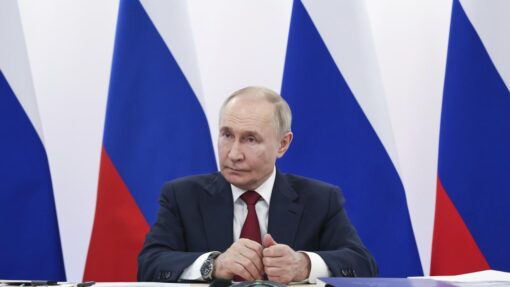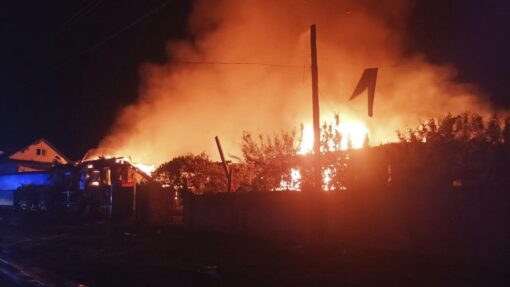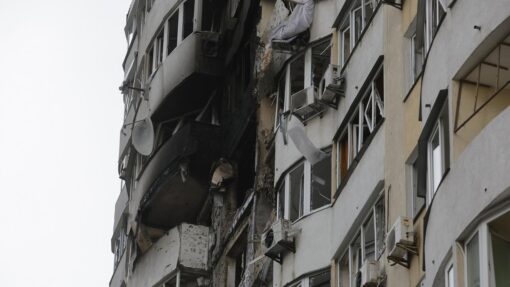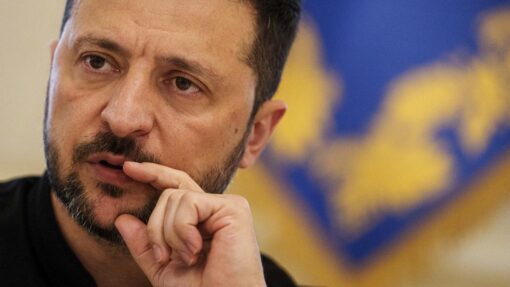After retreat, Ukraine digs in to repel Russian attacks
|
Ukraine’s military says its troops have taken up new defensive positions in the east after retreating from the captured town of Avdiivka and are repelling Russian attempts to develop the offensive thrust.
Russia took full control of devastated Avdiivka after Kyiv’s troops withdrew over the weekend, handing the Kremlin its biggest battlefield advance since capturing the city of Bakhmut in May.
Avdiivka’s fall was the clearest sign the tide of the war has turned in Russia’s favour as Kyiv struggles to regenerate manpower and US Republicans scupper attempts to rearm Washington’s ally battling a much larger and better armed foe.

“The Ukrainian military has established itself on new lines of defence and is successfully repelling attempts by the Russian invaders to develop an offensive,” Brigadier-General Oleksandr Tarnavskyi wrote on Telegram messenger on Monday.
Russian forces were regrouping and searching for pockets of resistance in Avdiivka, while attacking near the occupied eastern town of Mariinka and near a Kyiv-held southeastern village, military spokesman Dmytro Lykhoviy said.
The capture of Avdiivka pushes Ukrainian forces further from the Russian-held bastion city of Donetsk, an important logistics hub used by Moscow to support its operations across partially-occupied eastern Ukraine, a region known as the Donbas.
Serhiy Zgurets, director of the Kyiv-based Defence Express consultancy, predicted Russian forces would try to “straighten out” the front line around Mariinka and launch a fresh push around the town of Vuhledar, which is held by Kyiv.
Zgurets said Moscow forces had around 80,000 troops deployed around Bakhmut and a further 40,000 troops around Avdiivka, and would likely try to push towards the town of Chasiv Yar.
Russian President Vladimir Putin has described the capture of Avdiivka as an important victory, and Moscow has said Kyiv’s pullback was chaotic and rushed, with some soldiers and weapons left behind.

“The withdrawal was prompted by the threat of an enemy breakthrough that would have cut all supply routes for the grouping in the eastern part of the Avdiivka,” Zgurets said, adding that he believed the pullback was well executed.
Some troops from Ukraine’s Third Assault Brigade, which was rushed into the town to reinforce Kyiv’s troops last week, were completely surrounded at one point, but managed to break out, their deputy commander, Maksym Zhoryn, said.
Pavel Mogila, commander of an armoured unit in a Russian militia force fighting for Ukraine, said they helped evacuate forces from the city using three vehicles.
“We were standing in the Lastochkyne area. If the Russians had neared the road, taken the tree lines around it, then that would have been it, the road would have been blockaded and Avdiivka fully surrounded.”
Andrii Taran, a commander in the 110th Brigade, said Russia had “exhausted” the defenders with constant attacks by small groups of three or four soldiers, while bombing with guided aerial bombs.

Oleh Zhdanov, a Kyiv-based military analyst, said: “Russia will most likely try to seize as much territory as possible in the near future, especially within the borders of those territories that Putin has declared to be Russian.”
Moscow unilaterally declared it had annexed the Ukrainian regions of Donetsk, Luhansk, Kherson and Zaporizhzhia in 2022 despite not fully controlling any of them.
Also on Monday, Russia’s Defence Ministry said that Ukraine poisoned the Moscow-installed governors of Ukraine’s Kherson and Luhansk regions, though both were still alive.
In a briefing published online, the ministry said Ukraine poisoned Moscow-appointed Luhansk governor Leonid Pasechnik in December 2023, and Kherson head Vladimir Saldo in August 2022.
The briefing said that on December 5 Pasechnik, a former officer in Ukraine’s SBU security service turned pro-Russia separatist, “received severe poisoning with phenolic compounds”. It gave no information about the current state of his health.
It said that Saldo, a former mayor of Kherson city and pro-Russian lawmaker in Ukraine’s parliament, had been hospitalised on August 9, 2022, with symptoms of poisoning.
Russian-installed authorities in Kherson said in August 2022 that Saldo had fallen sick, but did not say that he had been poisoned. Saldo has since returned to public prominence in the Russian-controlled part of Kherson region.
Reuters


